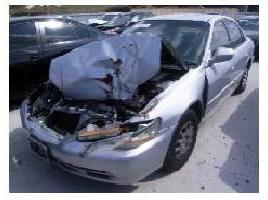Ask an Attorney a Question for FREE!
Loss of Business Income
Simple Concept: A lot of paper work!
Loss of business income is a claim that can be made when there is a bodily injury or a property damage claim. The obvious requirement for this claim is the “business” part.
You must have a business before you can make a claim for loss of business income. Independent contractors, self-employed persons, and/or people that earn a living on commission-based jobs can make this claim (they would make this claim as opposed to a loss of wages claim).

The claim is simple to understand. Someone injures you (or damages your tools) and makes it so you cannot earn as much as you were earning before the accident.
You would be owed for the earnings lost. However, loss of business income is one of the most complex claims to argue.
The insurance carrier will remind you that you must show damages. This will mean that you must show actual monetary loss.
The insurance company will make you show documentation about your income. The issue really is that when you are self-employed, work on a commission-paid basis, or are an independent contractor this can be a very hard show.
The fact that you have a business could mean that you can make money even if you are not at work!
It can also mean that you have no income at all during certain periods of time, or that not only are you not earning income, but you have expenses and bills that will go unpaid because you cannot produce anymore.
If you are an independent contractor you would have to show that you had jobs lined up after you finished the current work that you could not start because of the accident.
Get a great Bodily Injury E-book for more key information.

If you are a dentist, you will have to show that you moved your appointments and that your dental assistants could not possibly or legally perform on your behalf (a cleaning).
If you are a Realtor, then you are going to be faced with a lot of issues in showing your wages.
A house takes more than a week to sell and there are many factors that could delay the closing date (financing, home inspection, appraisal, etc.). The insurance adjuster will be quick to tell you that there is not enough evidence to support your payment for your loss of commissions.
The real issue will be proving your damages. The insurance carrier will make many arguments to not pay what they owe you for. They will ask you for documentation and then some more documentation.
They will want to see medical records that justify your being out of work. They will also want to see the entire financial picture of your business. A loss of business income can become the biggest nightmare.
The most common and somewhat fair resolution is to show your personal income tax form. I know this is probably giving the insurance company too much information and sometimes you cannot give your tax info (you did not file taxes).

If you can show how much you earn solely by your work (not real estate, investments, dividends, savings, SSI, disability, etc.), then you are going to show that number divided by the days you could not work. This will give you an average salary per day.
If your loss of business income is greater than what the average income day per day was (say your work is seasonal), then you have to present proof to be able to show to the carrier why you should be paid more. Also, you could add two or three years of tax data to make your numbers look much closer to reality.
There are obviously problems with this approach. If your business is taking off, then you could have problems showing that your actual loss income (now) should be more than the past taxes can show.
Whatever your argument is, make sure you have a way to show documentation or actual evidence of your loss.
Your insurance company knows that if you cannot show paperwork to them, then you cannot show paperwork to a court of law.

If you’ve been injured and don’t know what to do next, a local personal injury attorney can answer your questions and help you decide on your next steps.
The insurance claim process can be complicated, and insurance companies don’t always act in your best interests. Just fill out the form below so you can talk with a personal injury lawyer near you.
Insurance companies are not on your side. You should either get this personal injury eBook or talk to a personal injury attorney before you make any decisions!
|
|
Follow the links below for more information about accident injuries, bodily injury claims, and what to ask when making this type of claim.
1. Who can make a bodily injury claim
2. Reserving your bodily injury claim
3. Soft Tissue Claim Part I
4. Permanent Injury Claim
5. Medical bills, medicine, expenses
6. Loss of Wages
7. Loss of Earning Capacity
8. Loss of Business Income
9. Loss of Consortium
10. Loss of Quality of Life
11. Loss of Essential Services
12. Future Treatment and Expenses
13. Pain and Suffering
14. Prior Injuries
15. Psychological Injuries
16. Personal Injury Claim Settlement (evaluation of a claim)
17. Car Accident Injury Claim and Burden of Proof
18. What affects compensation for back and other injury claims
19. A word about Head Injuries
Making a Personal Injury Claim: Steps 1 to 5
Making a Personal Injury Claim: Steps 6 to 10
Pain and Suffering Reimbursement
Damages Calculation
Injury Demand Letter - How to write one
When to write an Injury Settlement Demand Letter
The Actual Injury Demand Letter (Format)
Find a Qualified Attorney in Your City
|
For a Free Review of Your Case
Please Call (866) 878-2432 |


